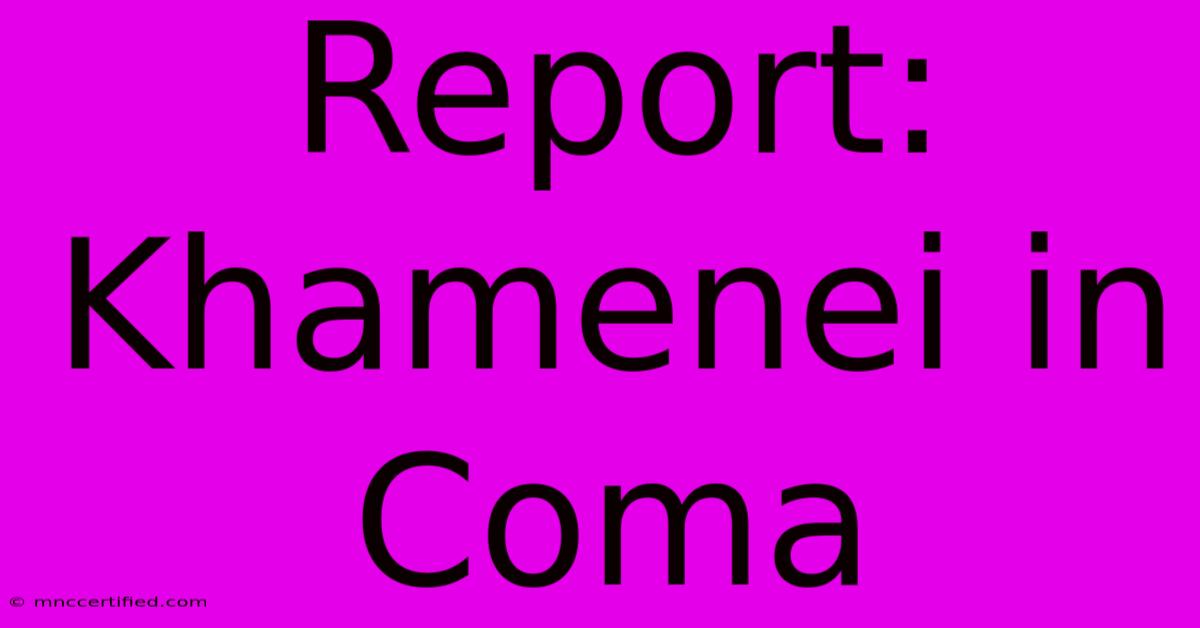Report: Khamenei In Coma

Table of Contents
Report: Khamenei in Coma – Fact-Checking the Rumors and Assessing the Implications
The internet is abuzz with reports claiming that Ayatollah Ali Khamenei, Supreme Leader of Iran, is in a coma. These rumors, circulating rapidly across social media and various news outlets, demand careful scrutiny. This article will examine the evidence (or lack thereof), analyze the potential implications of such a scenario, and provide context for understanding the information landscape surrounding this sensitive topic.
The Current State of Information: A Lack of Concrete Evidence
It's crucial to preface this discussion by stating that no credible, verifiable evidence currently supports the claim that Ayatollah Khamenei is in a coma. Many reports originate from unverified sources, often relying on anonymous tips or speculation. The Iranian government, known for its tight control over information, has remained silent on the matter, fueling the speculation but offering no confirmation. This silence, while not definitive proof, contributes to the ambiguity and uncertainty surrounding the situation.
Analyzing the Sources: Separating Fact from Fiction
The reports circulating online often cite anonymous sources within Iran's political or medical establishment. However, the lack of corroboration from reputable international news organizations or independent fact-checkers raises significant concerns about the reliability of these claims. It's crucial to critically evaluate the source of any information before accepting it as truth, especially in a politically charged environment like Iran. Remember to check the credibility of websites and news sources before drawing conclusions.
Potential Implications: A Shifting Power Dynamic in Iran
If the reports were true, the consequences for Iran would be profound. The succession process for the Supreme Leader is complex and potentially volatile. A power vacuum could lead to internal political struggles, instability, and potentially even violent conflict. The impact on Iran's foreign policy and its relationship with other countries remains uncertain, but significant changes are highly probable. The international community would need to navigate a challenging situation, managing its relations with a potentially weakened or fractured Iran.
The Importance of Verified Information in a Volatile Situation
The spread of misinformation can have serious consequences, both domestically and internationally. In a situation as sensitive as the health of a national leader, it's essential to rely on credible and verifiable information sources. Avoid sharing unverified reports and always cross-reference information from multiple reputable sources before drawing conclusions.
Conclusion: Awaiting Official Confirmation and Responsible Reporting
While rumors about Ayatollah Khamenei's health persist, the lack of concrete evidence necessitates caution. The international community, news organizations, and individuals should prioritize responsible reporting and avoid spreading unsubstantiated claims. Until official confirmation is released from credible sources, any claims regarding his health should be treated with skepticism. The situation warrants close monitoring, but responsible dissemination of information is paramount. It's vital to rely on official statements and reputable news organizations for accurate updates. Any speculation should be clearly labeled as such.
Keywords: Khamenei, Iran, Supreme Leader, coma, health, rumors, political instability, succession, foreign policy, misinformation, fact-check, credible sources, news, verified information.

Thank you for visiting our website wich cover about Report: Khamenei In Coma. We hope the information provided has been useful to you. Feel free to contact us if you have any questions or need further assistance. See you next time and dont miss to bookmark.
Featured Posts
-
Itvs I M A Celeb Dean Mc Culloughs Past
Nov 18, 2024
-
Browns Announce Week 11 Inactive List
Nov 18, 2024
-
Coleen Rooney I M A Celeb
Nov 18, 2024
-
Goff Sets Lions Nfl History In Win
Nov 18, 2024
-
2024 Grand Slam Darts Littlers Victory
Nov 18, 2024